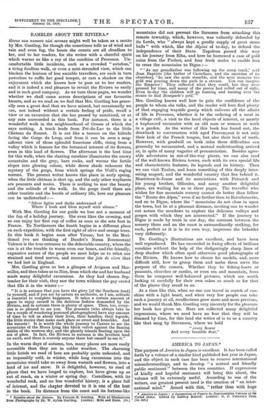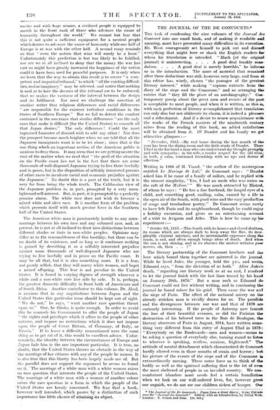AMERICA TO JAPAN.*
Tux purpose of America to Japan is excellent. It has been called forth by a volume of a similar kind published last year in Japan, and the object in each case has been to remove international misunderstandings, and to develop " a mutual and friendly public sentiment " between the two countries. If expressions of kindly and hopeful sentiment will bring this about, the volume will be extremely useful. According to one of the writers, our greatest present need is the creation of " an inter- national mind." Armed with this, " rather than with huge • America to Japan : a Synepotiwn of Papers by Reprecentativo Citizens of Gas
navies and with huge armies, a civilized people is equipped to march in the front rank of those who advance the cause of humanity throughout the world." We cannot but fear that this is not quite a sufficient equipment for a neutral people which desires to advance the cause of humanity while one half of Europe is at war with the other half. A second essay reminds us that " even the nation that wins will surely be a loser." Unfortunately this prediction is but too likely to be fulfilled, nor are we at all inclined, to deny that the money the war has cost us might have greatly increased the happiness of the nation could it have been used for peaceful purposes. It is only when we learn that the way to obtain this result is to create " a com- petent and impartial tribunal," to which " all the existing difficul- ties, real or imaginary," may be referred, and notice that nothing is said as to how the decrees of this tribunal are to be enforced, that we realize the vastness of the interval between the design and its fulfilment. Nor need we challenge the assertion of another writer that religious differences and racial differences " are responsible for the existent turbulent conditions in the States of Southern Europe." But we fail to detect the comfort contained in the assurance that similar differences "are the only ones that make it difficult [for the United States] to concede all that Japan desires." The only difference ! Could the most ingrained fomenter of discord wish to add any other ? Nor does the prospect become much brighter when we are told that all the Japanese immigrants want is to be let alone ; since that is the one thing which an important section of the American public is anxious to deny them. It may seem that we are getting nearer the root of the matter when we read that " the peril of the situation on the Pacific coast lies not in the fact that there are some thousands of well-disposed Japanese trying to live there lawfully and in peace, but in the disposition of selfishly interested persons of other races to inculcate racial and economic prejudice against the Japanese." No doubt this is a part of the truth, but it is very far from being the whole truth. The Californian view of the Japanese problem is, in part, prompted by a very unen- lightened self-interest. But, in part, it is prompted by a perfectly genuine alarm. The white race does not wish to become a mixed white and olive race. It is another form of the problem which presents itself with much greater force in the Southern half of the United States.
The American white man is passionately hostile to any inter- marriage between his own race and any coloured race, and, at present, he is not at all inclined to draw nice distinctions between different shades or tints in non-white peoples. Opinions may differ as to the reasonableness of this hostility, but there can be no doubt of its existence, and so long as it continues nothing is gained by describing it as a selfishly interested prejudice against some thousands of well-disposed Japanese who are trying to live lawfully and in peace on the Pacific coast. It may be all that, but it is also something more. It is a fear, not purely selfish, that they will marry -white women, and beget a mixed offspring. This fear is not peculiar to the United States. It is found in varying degrees of strength wherever a white and a non-white race live side by side. It is, perhaps, the greatest domestic difficulty in front both of Americans and of South Africa. Another contributor to this volume, Dr. Aked, is anxious that in any negotiations between Japan and the United States this particular issue should be kept out of sight. " We do not," he says, " want another race question thrust upon us." One, he thinks, is quite enough. In order to avoid this he counsels his Government to offer the people of Japan " the rights and privileges which it offers to the people of other nations, and impose no restrictions which it does not impose upon the people- of Great Britain, of Germany, of Italy, or Russia." If to leave a difficulty unmentioned were the same thing as to get rid of it, this would be excellent advice. Unfor- tunately; the identity between the circumstances of Europe and Japan fails him in the one important particular. It is true, no doubt, that the United States throws no obstacle in the way of the marriage of het citizens with any of the people he names. It ' is also true- that this liberty has been largely made use of. But the parallel does not support the argument he seems to found on it. The marriage of a White man with a white woman raises no race question that interests the people of the United States. The marriage of a white man with a woman of another colour raises the-race question in a form in which the people of the -United States are keenly concerned. We fear, that , a loOk, `however 'well intended, which pastes' 15V a distinction of such importance has little chance of attaining. its object. •



















































 Previous page
Previous page